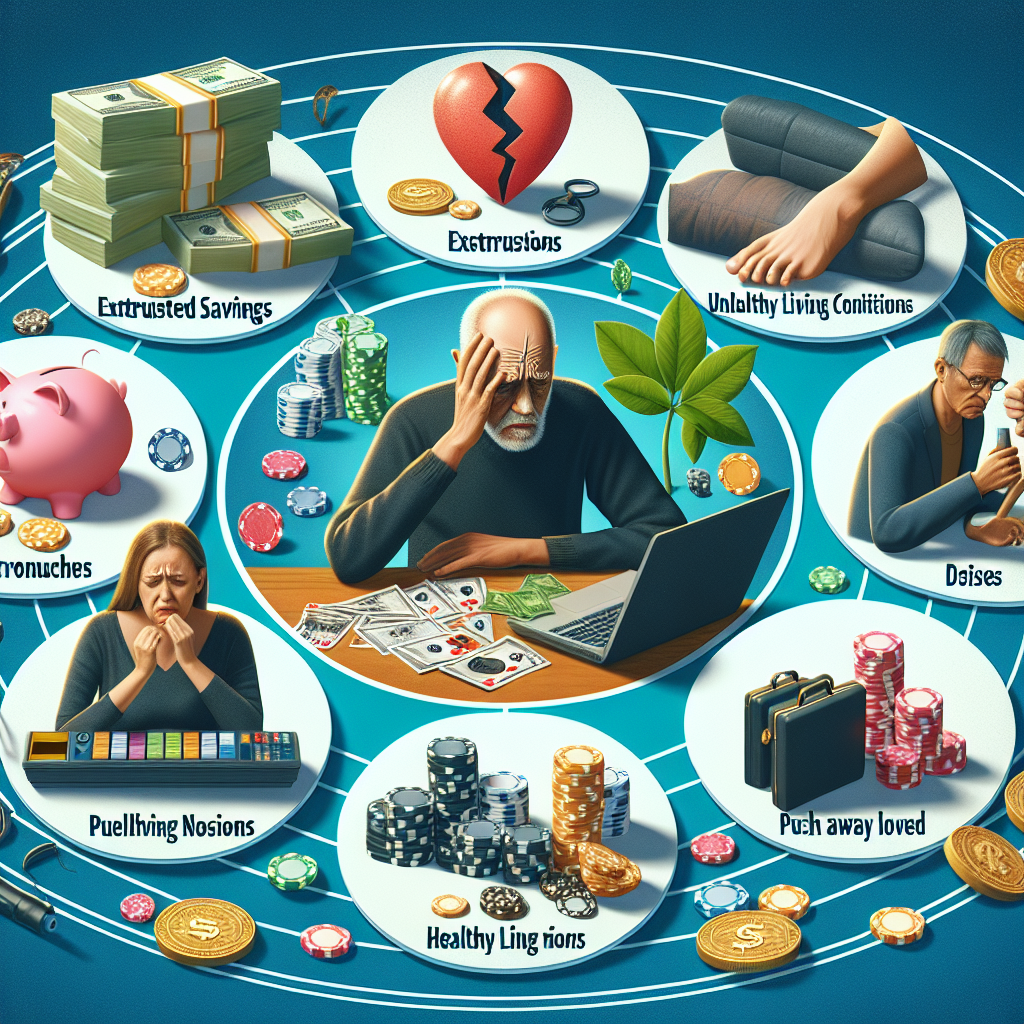-
Table of Contents

“Neglecting gambling addiction recovery can lead to financial ruin, broken relationships, and severe mental health issues.”
Introduction
Gambling addiction, also known as compulsive gambling or gambling disorder, is a serious condition that can have devastating effects on an individual’s life. The risks of not seeking recovery for gambling addiction are manifold and can impact various aspects of a person’s well-being. Financial ruin is one of the most immediate and apparent risks, as individuals may deplete their savings, incur massive debts, or even resort to illegal activities to fund their gambling habits. This financial instability can lead to homelessness and an inability to meet basic needs. Additionally, the psychological toll is significant, with increased rates of anxiety, depression, and suicidal ideation among those who do not seek help. Relationships with family and friends often deteriorate due to broken trust and the emotional strain caused by the addiction. Furthermore, the physical health of the individual may decline due to stress and neglect of self-care. In the workplace, job performance can suffer, leading to unemployment and further financial distress. Overall, the failure to seek recovery from gambling addiction can result in a downward spiral that affects every facet of an individual’s life, making it imperative to address the issue through appropriate treatment and support.
Financial Ruin: The Consequences of Ignoring Gambling Addiction Recovery
Gambling addiction is a pervasive issue that can have devastating effects on an individual’s life, particularly in the realm of financial stability. Ignoring the need for recovery from gambling addiction can lead to a cascade of financial ruin, impacting not only the individual but also their family and community. The risks associated with not seeking help for gambling addiction are multifaceted, and understanding these risks is crucial for inspiring those affected to take the necessary steps toward recovery.
One of the most immediate and apparent consequences of untreated gambling addiction is the depletion of personal savings. Individuals with a gambling problem often find themselves dipping into their savings accounts, retirement funds, or even taking out loans to fuel their addiction. This behavior can quickly erode financial security, leaving the individual without a safety net for future needs or emergencies. The loss of savings can be particularly devastating for those who have spent years building their financial reserves, only to see them vanish in a short period due to compulsive gambling.
In addition to the loss of savings, gambling addiction can lead to mounting debt. Many individuals turn to credit cards, payday loans, or other high-interest borrowing options to continue gambling. As debts accumulate, the financial pressure intensifies, creating a vicious cycle where the individual feels compelled to gamble even more in a desperate attempt to win back lost money. This cycle of debt and gambling can quickly spiral out of control, leading to severe financial distress and, in some cases, bankruptcy.
The financial strain caused by gambling addiction often extends beyond the individual to their family. Loved ones may be unaware of the extent of the problem until it is too late, finding themselves suddenly faced with unpaid bills, repossessed assets, or foreclosure on their home. The stress and anxiety caused by these financial hardships can strain relationships, leading to conflicts, separation, or even divorce. Children in the household may also suffer, as the financial instability can impact their education, extracurricular activities, and overall well-being.
Moreover, the financial consequences of gambling addiction can have broader societal implications. Individuals who are financially ruined by gambling may turn to illegal activities, such as theft or embezzlement, to obtain money. This not only puts them at risk of legal repercussions but also contributes to a cycle of crime and instability within the community. Additionally, the economic burden of gambling addiction can strain public resources, as individuals may require social services, mental health support, or financial assistance to cope with the fallout of their addiction.
Despite the grim picture painted by these potential consequences, it is important to recognize that recovery from gambling addiction is possible and can lead to a renewed sense of financial stability and personal well-being. Seeking help through counseling, support groups, or treatment programs can provide individuals with the tools and strategies needed to overcome their addiction and rebuild their lives. By addressing the root causes of their gambling behavior and developing healthier coping mechanisms, individuals can regain control over their finances and work towards a more secure and fulfilling future.
In conclusion, the risks of not seeking gambling addiction recovery are profound and far-reaching, encompassing personal financial ruin, familial distress, and broader societal impacts. However, by taking proactive steps towards recovery, individuals can break free from the cycle of addiction and pave the way for a brighter, more stable future. The journey to recovery may be challenging, but the rewards of financial stability and improved quality of life make it a worthwhile endeavor.
Mental Health Decline: The Hidden Dangers of Unaddressed Gambling Addiction
Gambling addiction, often referred to as compulsive gambling or gambling disorder, is a serious condition that can have profound effects on an individual’s mental health. When left unaddressed, the risks associated with gambling addiction can escalate, leading to a cascade of negative consequences that permeate various aspects of life. One of the most insidious dangers of not seeking recovery from gambling addiction is the decline in mental health, which can manifest in numerous ways and create a vicious cycle of despair and hopelessness.
Initially, the thrill of gambling may provide a temporary escape from life’s stresses, but as the addiction takes hold, the stakes become higher, and the losses more significant. This can lead to feelings of guilt, shame, and anxiety, which are often compounded by the financial strain that accompanies compulsive gambling. The constant worry about mounting debts and the pressure to recoup losses can create a relentless mental burden, making it difficult for individuals to focus on anything other than their next bet. Over time, this preoccupation with gambling can erode self-esteem and lead to a pervasive sense of worthlessness.
Moreover, the social isolation that often accompanies gambling addiction can exacerbate mental health issues. As individuals become more consumed by their addiction, they may withdraw from family and friends, leading to strained relationships and a lack of social support. This isolation can intensify feelings of loneliness and depression, creating a feedback loop that drives the individual further into their addiction. Without the support of loved ones, it becomes increasingly challenging to break free from the cycle of gambling and seek the help needed for recovery.
In addition to the emotional toll, unaddressed gambling addiction can also lead to severe psychological consequences. The constant stress and anxiety associated with gambling can trigger or worsen mental health conditions such as depression, anxiety disorders, and even suicidal ideation. The sense of hopelessness that often accompanies these conditions can make it difficult for individuals to see a way out, leading them to believe that their only option is to continue gambling in the hopes of a big win that will solve their problems. Unfortunately, this rarely happens, and the cycle of addiction continues, further deteriorating mental health.
Furthermore, the cognitive distortions that often accompany gambling addiction can impair an individual’s ability to make rational decisions. The belief in “chasing losses” or the illusion of control over random outcomes can lead to increasingly risky behavior, which not only jeopardizes financial stability but also mental well-being. As these cognitive distortions become more ingrained, they can create a distorted reality where gambling becomes the primary focus, overshadowing all other aspects of life.
Despite the daunting challenges, it is important to remember that recovery from gambling addiction is possible, and seeking help can lead to significant improvements in mental health. Therapy, support groups, and counseling can provide the tools and support needed to break free from the cycle of addiction and rebuild a healthier, more fulfilling life. By addressing the underlying issues that contribute to gambling addiction and developing healthier coping mechanisms, individuals can regain control over their lives and restore their mental well-being.
In conclusion, the risks of not seeking recovery from gambling addiction are profound and far-reaching, particularly in terms of mental health decline. However, with the right support and resources, it is possible to overcome these challenges and embark on a path to recovery. Taking the first step towards seeking help can be daunting, but it is a crucial move towards reclaiming one’s life and mental health.
Q&A
1. **Financial Ruin**: Not seeking gambling addiction recovery can lead to severe financial problems, including accumulating debt, bankruptcy, and loss of assets.
2. **Mental Health Issues**: Ignoring gambling addiction can exacerbate mental health issues such as depression, anxiety, and increased stress, potentially leading to suicidal thoughts or actions.
Conclusion
The risks of not seeking gambling addiction recovery include financial ruin, strained or broken relationships, mental health issues such as depression and anxiety, increased risk of substance abuse, legal problems, and potential loss of employment. These consequences can lead to a diminished quality of life and, in severe cases, suicidal thoughts or actions. Seeking recovery is crucial to mitigate these risks and restore stability and well-being.



